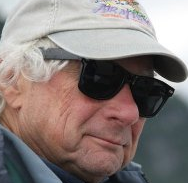Joe Rothstein: The Philadelphia Story: Featuring John Adams and Barack Obama
Last night I stayed up much too late watching HBO's miniseries, "John Adams."
No matter how many times I am told the story of the American Revolution I feel the riveting power of the moment and the extraordinary confluence of people and circumstance that birthed the United States of America. The story of America is more than a good yarn. What happened in Philadelphia during those few years altered the course of human history.
Today I watched Barack Obama speak from the very location where the nation's founders met 221 years ago. And, just as last night when I absorbed the drama of "John Adams," I felt the power of an extraordinary moment.
A black man with an excellent chance of becoming President of the United States, speaking from the birthplace of liberty would have been drama in and of itself. What made this moment historically compelling was the raw honesty of his words, delivered evenly, almost matter- of- factly, a message elevated in power by lack of oratorical flourishes.
In just-the-facts terms, Obama gave voice to the many obstacles yet to be overcome in bridging a racial divide so intractable that even the brave and wise men of the Revolution could not bring themselves to address it.
--The residual bitterness and hate still festering in the breasts of so many African-Americans whose grandparents and great parents were slaves.
--The sense of entitlement felt by so many blacks, matched by an equal sense of unfairness among so many whites who are asked to pay for the sins of their fathers.
--Working class white anger at perceived black advantages mandated by affirmative action, where jobs and enrollment compete.
--The inner city schools that continue to be de-facto segregated, and unequal.
--The busing alternative that so many whites have resisted.
--The demagoguery of politicians, both black and white, feeding off of fears and biases and misunderstandings of people caught on the edges of the racial divide.
It was as if David Letterman had created a list of the ten most politically incorrect racial topics to discuss in mixed company. Obama addressed them all, and then some.
Obama knows what they talk about at black barber shops and churches. He also knows what's said in so many white work places and living rooms. He's got a good grasp on the historical forces that brought us here.
What he doesn't know---what none of us yet know---is whether it is a winning hand to move those separate, but equal, racial whispers onto center stage where they can be discussed frankly and candidly.
That was Obama's message. Let's get it all out there in the open, because the only way the nation will solve the problems of its depressed inner cities, its high drug, crime and prison rates, its competition for educational and health resources, and so many other issues plaguing life in the U.S. today is by getting beyond race. Getting beyond race and clinically and dispassionately addressing problems with an intent to solve them.
Obama was backed into this speech because of the ginned up controversy over the words of the retired minister of his Chicago church. But as the Democratic Party's presidential nominee he would have had to deliver such a speech eventually. The Republicans replaced the Democrats as the southern majority party because they consciously courted the old segregationist vote. That's what Nixon's well-documented "southern strategy" was all about. Obama could never have made it from here to November without being caught up in racial controversy.
Obama sounded like a candidate long-prepared to make the speech he delivered. These words were not a one-night wonder cooked up by a team of clever speech writers. Obama's words rode upon the same spare and accessible poetry of his two books, where he was just as candid and every inch as hopeful.
Obama may have put the racial controversy behind him for both the primary and general elections with his speech today. On the other hand, it's entirely possible that Obama's call for bridging the racial divide will prove to be a first step down the incline of popularity that has put him on the verge of his party's nomination. It may be that from here on its merely a gradual erosion until he's out. Most candidates simply do not talk in public about what Obama talked about today. Generally, the opposition, the media and political commentators, and ultimately the voters, punish such candor.
Will Obama become a casualty for having so eloquently carried the banner of racial justice and human equality? John Adams faced the same choice in the same city 221 years ago. It's ironic that Adams' story, and Obama's are both getting a lot of TV time this week.
Joe Rothstein is a veteran national political strategist and media producer and editor of USPoliticstoday.com. He can be contacted at joe@ipdgroup.com.




